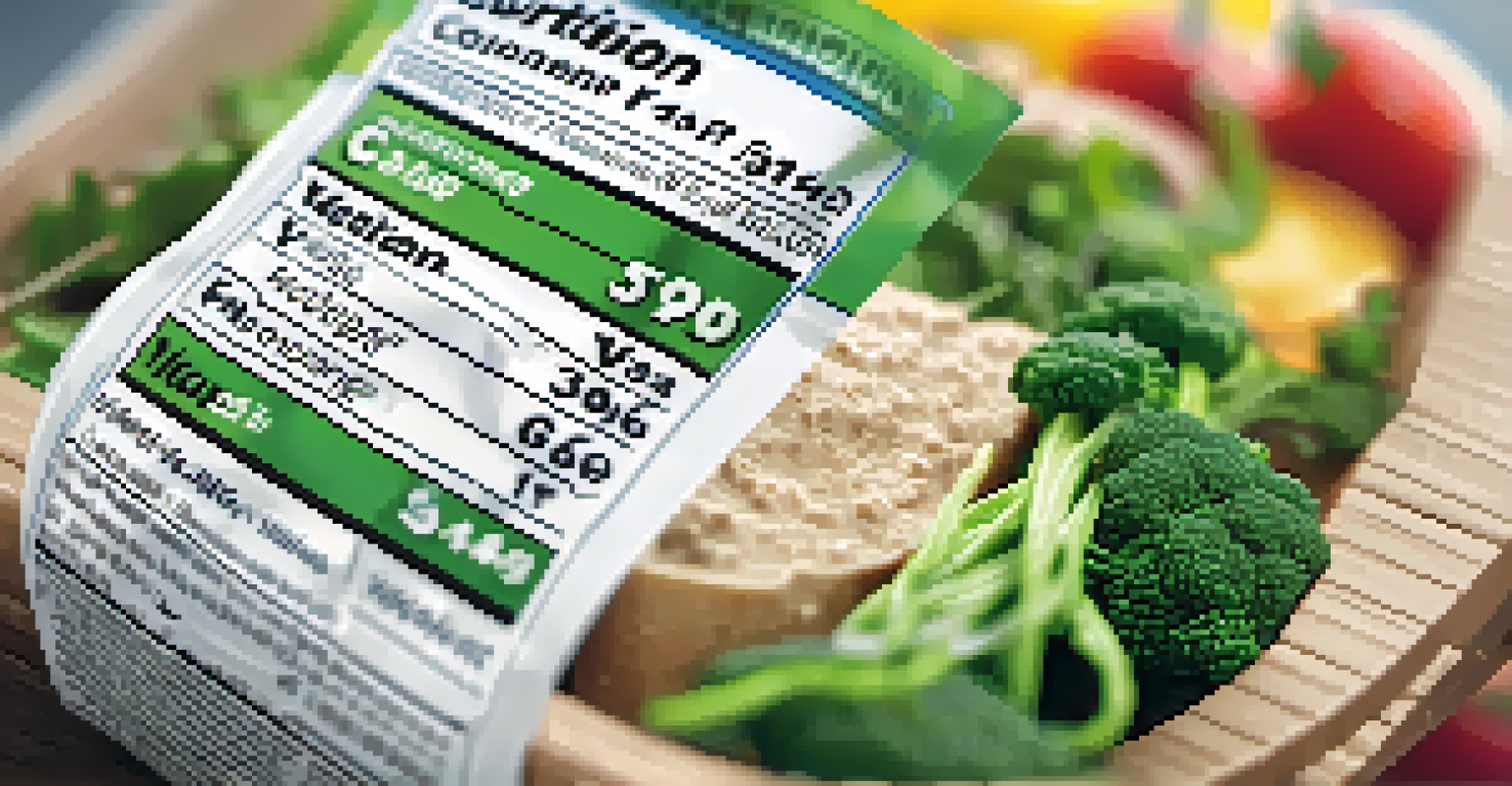Impact of Convenience Foods on Vegetarian Health Choices

Understanding Convenience Foods in Vegetarian Diets
Convenience foods are ready-to-eat or easy-to-prepare meals that save time, but they can vary widely in nutritional content. For vegetarians, these foods often include frozen meals, canned goods, and pre-packaged snacks. While they offer convenience, it's crucial to assess their ingredients to ensure they align with healthy eating habits.
You are what you eat, so don’t be fast, cheap, easy, or fake.
Many convenience foods marketed to vegetarians may still contain high levels of sodium, sugars, and preservatives, which can detract from the health benefits of a plant-based diet. For instance, a frozen veggie burger might be quick to prepare but could have additives that aren’t beneficial. Thus, understanding what’s in these products is essential for making informed choices.
Incorporating convenience foods into a vegetarian diet can be a balancing act. While they provide ease and variety, choosing the right options can help preserve the nutritional integrity of the diet. It’s about finding that sweet spot between convenience and health.
Nutritional Value of Convenience Vegetarian Foods
The nutritional value of convenience vegetarian foods can be a mixed bag. Some products are fortified with vitamins and minerals, while others might lack essential nutrients. For instance, many ready-made meals may not provide adequate protein or fiber, which are crucial for a balanced vegetarian diet.

When selecting convenience foods, it’s vital to read nutrition labels carefully. This practice can help identify items that are high in unhealthy fats or low in beneficial nutrients. By doing so, vegetarians can make choices that support their health rather than compromise it.
Choose Wisely: Read Nutrition Labels
Reading nutrition labels is crucial for vegetarians to identify healthy options among convenience foods.
A good rule of thumb is to look for convenience foods that contain whole foods, like grains, legumes, and vegetables. This can ensure that even when opting for convenience, vegetarians still nourish their bodies appropriately.
How Convenience Foods Affect Dietary Choices
The availability of convenience foods can significantly influence dietary choices among vegetarians. When faced with a busy schedule, the allure of quick, easy meals can lead to less mindful eating. This shift might encourage the selection of less nutritious options over whole, fresh foods.
Healthy eating is a way of life, so it’s important to establish routines that are simple, realistically, and ultimately enjoyable.
Moreover, the reliance on convenience foods can create a habit of grabbing whatever is on hand, leading to a more limited variety in one’s diet. Over time, this can result in nutrient deficiencies, undermining the health benefits that come with a vegetarian lifestyle.
To counteract this trend, it’s helpful for vegetarians to plan meals and snacks ahead of time. Preparing healthy, convenient options in advance can promote better eating habits and ensure that dietary choices remain diverse and nutritious.
The Role of Marketing in Convenience Food Choices
Marketing plays a crucial role in shaping perceptions about convenience foods, especially in the vegetarian sector. Many brands promote their products as healthy options, which can be misleading. Just because something is labeled 'vegetarian' doesn’t automatically mean it’s nutritious.
This marketing can create a false sense of security, leading consumers to overlook important nutritional information. For example, a product may boast about being meat-free while still being high in sugars or unhealthy fats. Therefore, it’s important for consumers to question these claims and dig deeper.
Balance Convenience with Nutrition
Combining convenience foods with fresh ingredients helps maintain a nutritious vegetarian diet.
Being an informed consumer means looking beyond attractive packaging and catchy slogans. By understanding the actual nutritional content, vegetarians can make choices that truly benefit their health rather than falling for clever marketing tactics.
Balancing Convenience and Nutrition in Vegetarian Meals
Finding a balance between convenience and nutrition is key for vegetarians. While convenience foods can simplify meal prep, they shouldn’t replace wholesome meals entirely. Striking a balance means using convenience foods as a supplement rather than a foundation of the diet.
One effective strategy is to combine convenience foods with fresh ingredients. For instance, adding fresh vegetables to a store-bought sauce can enhance its nutritional profile and flavor. This approach allows for quick meals without compromising health.
Meal prepping can also play a significant role here. By preparing healthy dishes in advance, vegetarians can enjoy the best of both worlds—convenient meals that are also nourishing. It’s all about making choices that prioritize health while fitting into a busy lifestyle.
Potential Health Risks of Overreliance on Convenience Foods
Overreliance on convenience foods can lead to various health risks for vegetarians. A diet rich in processed foods may result in a lack of essential nutrients, which can affect overall well-being. For example, insufficient intake of vitamins and minerals can lead to fatigue or weakened immunity.
Additionally, convenience foods often contain high levels of sodium, which can pose risks for heart health. Regular consumption of such products can contribute to hypertension and other cardiovascular issues over time. It’s crucial for vegetarians to be aware of these potential pitfalls.
Beware of Misleading Marketing Claims
Marketing can create false perceptions about convenience foods, making it essential for consumers to check actual nutritional content.
To mitigate these risks, it’s advisable to limit the intake of highly processed convenience foods and focus on whole foods whenever possible. By being mindful of what goes into their bodies, vegetarians can maintain a healthier, more balanced diet.
Making Informed Choices in Convenience Food Selection
Making informed choices when it comes to convenience foods is vital for maintaining a healthy vegetarian diet. It starts with understanding nutritional labels and recognizing what constitutes a healthy option. Knowledge is power, and being aware of ingredients can lead to better decisions.
Furthermore, seeking out brands that prioritize quality ingredients can make a significant difference. Many companies now focus on creating healthier convenience options that align with vegetarian values. Exploring these brands can enhance meal options without sacrificing health.

Engaging in community discussions or seeking advice from nutritionists can also provide valuable insights. By sharing experiences and tips, vegetarians can navigate the world of convenience foods more effectively, ensuring their dietary choices support their health goals.